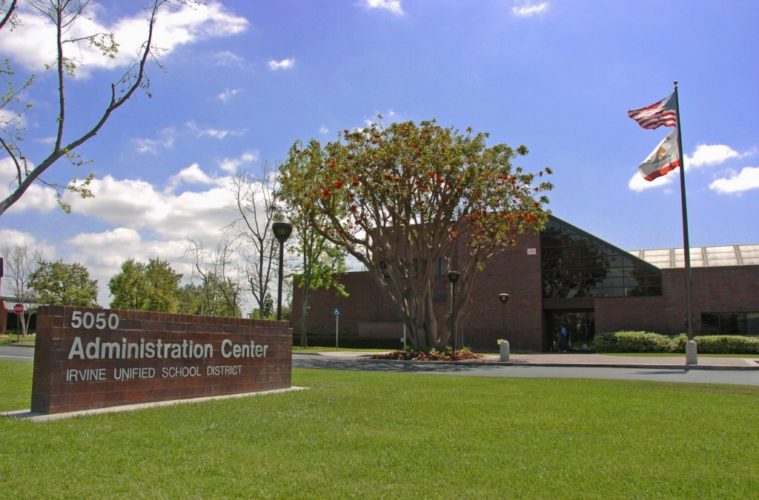As with a family or business financial plan, every government budget should include prudent steps to get through a major crisis. In analyzing their audited financial statements, the city of Irvine’s finances are in pretty good shape to weather the coronavirus crisis, but the Irvine Unified School District (IUSD) may be facing major problems.
In recent years I have issued reports on fiscal soundness based on the annual financial reports of California’s 482 cities, 944 school districts, 58 counties, 72 community colleges, the university systems and the state itself. These are simple but profoundly useful proxies to how our various governmental bodies are doing fiscally.
From Comprehensive Annual Financial Reports (CAFRs), the metric I use is the Unrestricted Net Position (UNP), which shows their bottom-line financial situation. The UNP can be positive (good) or negative (bad). Using census data, I derive the per capita UNP showing how much of the surplus or deficit belongs to each person.
For Irvine, the good news is the city’s UNP as of June 30, 2018 is $442 million, the highest of any city in the state. And its UNP per capita is $1,601, the 35th best in the state. For Orange County, only Tustin is better, at $1,835 per capita, and 32nd best in the state. Both cities are in my 37th Senatorial District.
For consistency in my latest City Report, which was released in January, I used data for the fiscal year ending June 30, 2018. (Irvine already has compiled its report for the fiscal year ending June 30, 2019. It is substantially the same, with a UNP of $434 million. As soon as all of California’s cities issue their June 30, 2019 CAFRs, I will publish a more current report.)
Irvine Unified’s Status
Alas, the good news does not extend to IUSD. For the fiscal year ending June 30, 2018, its UNP was a negative $254 million, or a negative $1,283 per capita. That placed IUSD in 23rd place of the 27 Orange County public school districts.
It had an unrestricted net deficit of $218 million for the year ended June 30, 2017. This gave it a per capita of ($1,115) and placed it 744th out of 944 school districts.
For the year ended June 30, 2018, Other Post-Employment Benefit liabilities had to be included on the balance sheets of all municipalities. This increased deficits and created a large amount of movement in the rankings. These once-hidden liabilities for retiree medical benefits account for the $36 million jump in IUSD’s deficit.
Although IUSD increased its negative per capita to ($1,283), it moved up in the statewide rankings to 706th place. But, the district’s trend is not encouraging. And $372 million in “aggregate net pension liabilities” is a heavy boat anchor to pull.
Since my California Schools report from last December, IUSD reported for the year ending June 30, 2019 that the UNP has grown to $277 million.
The Tax Temptation
IUSD will be tempted to deal with its impending fiscal crunch with a tax increase, such as Measure E in 2016. To pay for $319 million in construction bonds, it increased taxes on real property $29 per $100,000 of assessed value. More realistically, in a city where the median home value is $840,000, the tax increase was $244 per home per year. Proportional costs are passed along to renters.
Measure E passed with 60 percent of voters, 5 points above the necessary 55 percent approval threshold.
Given the increasing financial pressures faced by many Irvine voters today, a tax increase would be unlikely to pass. Indeed, just a month ago on March 3, in Orange County all nine school bond measures lost. So did Proposition 13 for statewide school bonds.
What Is to Be Done?
Serious reforms need to be pursued, including considering moving from defined benefit pension plans to shared-risk plans. Given the power of the teachers’ and classified workers’ unions in blocking needed reforms, there’s always the eventual chance of a state takeover of the district under what’s called the “AB 1200 system.”
It’s named after Assembly Bill 1200 from 1991 by then-Assemblywoman Delaine Eastin. Since then, nine districts have had the Fiscal Crisis and Management Assistance Team come in as the elected school board was set aside. The districts were given emergency loans and their finances put under strict financial supervision by the state. The biggest loan so far was $100 million to Oakland Unified in 2003.
Do duly elected school board members want to cede budgetary decisions and indiscriminate reforms to the state? Can teachers’ unions accommodate the needs of teachers, parents, students and taxpayers? Am I being too negative? Not in the least.
We are now at the beginning of a massive economic crisis. Let’s admit that and start working to stabilize one of the finest school districts in the nation.
John M.W. Moorlach, R-Costa Mesa, represents the 37th District in the California Senate, which includes all of Irvine
Advertising disclosure: We may receive compensation for some of the links in our stories. Thank you for supporting Irvine Weekly and our advertisers.

